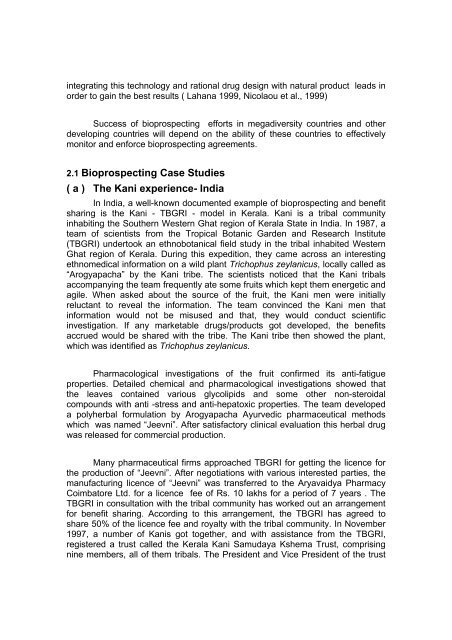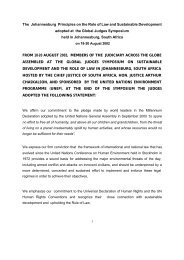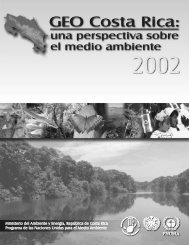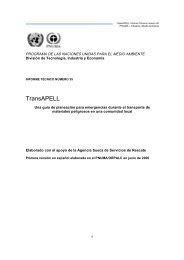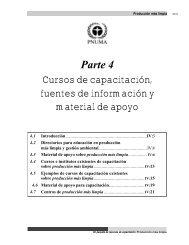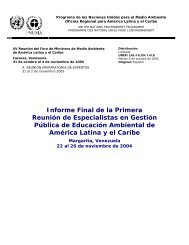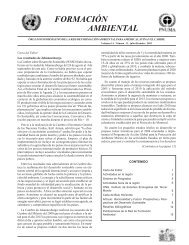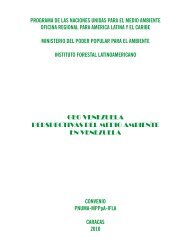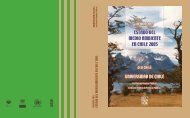biotechnology & bioprospecting for sustainable development
biotechnology & bioprospecting for sustainable development
biotechnology & bioprospecting for sustainable development
You also want an ePaper? Increase the reach of your titles
YUMPU automatically turns print PDFs into web optimized ePapers that Google loves.
integrating this technology and rational drug design with natural product leads in<br />
order to gain the best results ( Lahana 1999, Nicolaou et al., 1999)<br />
Success of <strong>bioprospecting</strong> ef<strong>for</strong>ts in megadiversity countries and other<br />
developing countries will depend on the ability of these countries to effectively<br />
monitor and en<strong>for</strong>ce <strong>bioprospecting</strong> agreements.<br />
2.1 Bioprospecting Case Studies<br />
( a ) The Kani experience- India<br />
In India, a well-known documented example of <strong>bioprospecting</strong> and benefit<br />
sharing is the Kani - TBGRI - model in Kerala. Kani is a tribal community<br />
inhabiting the Southern Western Ghat region of Kerala State in India. In 1987, a<br />
team of scientists from the Tropical Botanic Garden and Research Institute<br />
(TBGRI) undertook an ethnobotanical field study in the tribal inhabited Western<br />
Ghat region of Kerala. During this expedition, they came across an interesting<br />
ethnomedical in<strong>for</strong>mation on a wild plant Trichophus zeylanicus, locally called as<br />
“Arogyapacha” by the Kani tribe. The scientists noticed that the Kani tribals<br />
accompanying the team frequently ate some fruits which kept them energetic and<br />
agile. When asked about the source of the fruit, the Kani men were initially<br />
reluctant to reveal the in<strong>for</strong>mation. The team convinced the Kani men that<br />
in<strong>for</strong>mation would not be misused and that, they would conduct scientific<br />
investigation. If any marketable drugs/products got developed, the benefits<br />
accrued would be shared with the tribe. The Kani tribe then showed the plant,<br />
which was identified as Trichophus zeylanicus.<br />
Pharmacological investigations of the fruit confirmed its anti-fatigue<br />
properties. Detailed chemical and pharmacological investigations showed that<br />
the leaves contained various glycolipids and some other non-steroidal<br />
compounds with anti -stress and anti-hepatoxic properties. The team developed<br />
a polyherbal <strong>for</strong>mulation by Arogyapacha Ayurvedic pharmaceutical methods<br />
which was named “Jeevni”. After satisfactory clinical evaluation this herbal drug<br />
was released <strong>for</strong> commercial production.<br />
Many pharmaceutical firms approached TBGRI <strong>for</strong> getting the licence <strong>for</strong><br />
the production of “Jeevni”. After negotiations with various interested parties, the<br />
manufacturing licence of “Jeevni” was transferred to the Aryavaidya Pharmacy<br />
Coimbatore Ltd. <strong>for</strong> a licence fee of Rs. 10 lakhs <strong>for</strong> a period of 7 years . The<br />
TBGRI in consultation with the tribal community has worked out an arrangement<br />
<strong>for</strong> benefit sharing. According to this arrangement, the TBGRI has agreed to<br />
share 50% of the licence fee and royalty with the tribal community. In November<br />
1997, a number of Kanis got together, and with assistance from the TBGRI,<br />
registered a trust called the Kerala Kani Samudaya Kshema Trust, comprising<br />
nine members, all of them tribals. The President and Vice President of the trust


